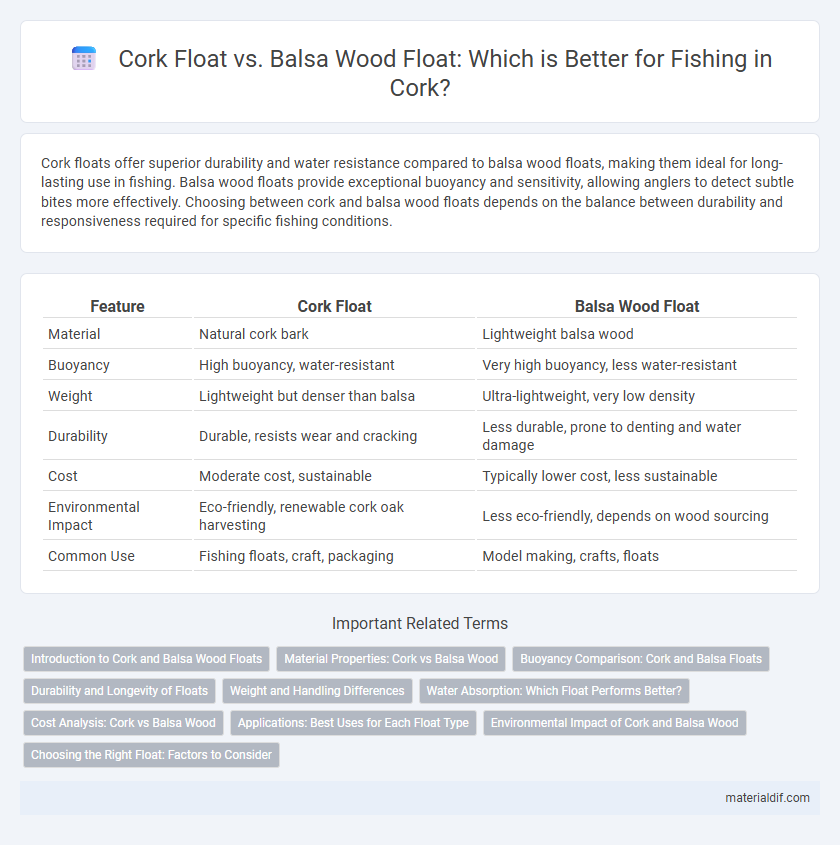Cork floats offer superior durability and water resistance compared to balsa wood floats, making them ideal for long-lasting use in fishing. Balsa wood floats provide exceptional buoyancy and sensitivity, allowing anglers to detect subtle bites more effectively. Choosing between cork and balsa wood floats depends on the balance between durability and responsiveness required for specific fishing conditions.
Table of Comparison
| Feature | Cork Float | Balsa Wood Float |
|---|---|---|
| Material | Natural cork bark | Lightweight balsa wood |
| Buoyancy | High buoyancy, water-resistant | Very high buoyancy, less water-resistant |
| Weight | Lightweight but denser than balsa | Ultra-lightweight, very low density |
| Durability | Durable, resists wear and cracking | Less durable, prone to denting and water damage |
| Cost | Moderate cost, sustainable | Typically lower cost, less sustainable |
| Environmental Impact | Eco-friendly, renewable cork oak harvesting | Less eco-friendly, depends on wood sourcing |
| Common Use | Fishing floats, craft, packaging | Model making, crafts, floats |
Introduction to Cork and Balsa Wood Floats
Cork floats and balsa wood floats are popular choices for fishing due to their buoyancy and lightweight properties that enhance stability on water surfaces. Cork, derived from the bark of cork oak trees, is naturally water-resistant and durable, making it ideal for long-lasting floats. Balsa wood, known for its exceptional lightness and ease of shaping, offers superior sensitivity to fish bites, helping anglers detect even the slightest tug.
Material Properties: Cork vs Balsa Wood
Cork exhibits superior buoyancy due to its natural cellular structure filled with air pockets, making it highly water-resistant and durable for float applications. Balsa wood, while extremely lightweight with a density as low as 160 kg/m3, is less water-resistant and can absorb moisture, compromising its flotation performance over time. Cork's elasticity and resistance to compression provide long-lasting floatation, whereas balsa wood's softness makes it prone to damage and degradation in aquatic environments.
Buoyancy Comparison: Cork and Balsa Floats
Cork floats exhibit higher buoyancy due to their closed-cell structure, which traps air more effectively than the porous balsa wood. Balsa wood floats tend to absorb water over time, reducing buoyancy and durability in aquatic environments. The density of cork, typically around 0.24 g/cm3, is lower than balsa wood's average density of 0.16 to 0.20 g/cm3, but cork's water resistance enhances its floatation capacity.
Durability and Longevity of Floats
Cork floats exhibit superior durability and longevity compared to balsa wood floats due to their natural resistance to water absorption and microbial decay. Cork's cellular structure enhances buoyancy retention over time, making it less prone to damage from prolonged exposure to moisture. In contrast, balsa wood floats require frequent maintenance as their softer texture tends to degrade faster, reducing overall lifespan in aquatic environments.
Weight and Handling Differences
Cork floats are notably lighter than balsa wood floats, offering enhanced buoyancy and easier maneuverability on water. The lightweight nature of cork provides anglers with more sensitive handling and improved casting control. In contrast, balsa wood floats, while buoyant, are typically heavier and may be less responsive to subtle bites.
Water Absorption: Which Float Performs Better?
Cork floats exhibit significantly lower water absorption compared to balsa wood floats, maintaining their buoyancy and structural integrity over extended periods in water. Balsa wood, despite being lightweight, tends to absorb more water, leading to swelling and reduced performance during fishing activities. The superior water resistance of cork makes it a more reliable choice for float durability and consistent buoyancy.
Cost Analysis: Cork vs Balsa Wood
Cork floats typically cost more upfront than balsa wood floats due to the sustainable harvesting process and higher material density. Balsa wood floats offer a lower initial price but may incur additional expenses over time because of their susceptibility to water absorption and faster degradation. Long-term cost efficiency favors cork floats as they provide greater durability and reduced maintenance requirements.
Applications: Best Uses for Each Float Type
Cork floats excel in fishing applications due to their natural buoyancy, lightweight, and durability, making them ideal for freshwater and saltwater environments where sensitivity to bites is crucial. Balsa wood floats offer superior floatation and visibility, preferred in competitive angling and still water fishing because of their fine-tuned balance and responsiveness. Choosing between cork and balsa wood floats depends on fishing conditions, with cork favored for rugged, versatile use and balsa wood selected for precision in calm, controlled settings.
Environmental Impact of Cork and Balsa Wood
Cork floats derive from the bark of the cork oak tree, a renewable resource that promotes biodiversity and requires minimal processing, resulting in a low carbon footprint and biodegradability. Balsa wood floats come from fast-growing trees, but their cultivation often involves deforestation and higher energy consumption in harvesting and processing, contributing more to environmental degradation. The sustainable harvesting of cork and its natural resistance to decay make it a more eco-friendly option compared to balsa wood, which poses greater environmental risks due to habitat loss and carbon emissions.
Choosing the Right Float: Factors to Consider
When choosing between a cork float and a balsa wood float, consider factors such as durability, water absorption, and finishing quality. Cork floats offer greater resistance to water damage and wear, making them ideal for prolonged use, while balsa wood floats provide a lighter weight option with a smoother finish for detailed plastering tasks. Evaluate project requirements and surface conditions to determine the most effective float for optimal performance and longevity.
cork float vs balsa wood float Infographic

 materialdif.com
materialdif.com